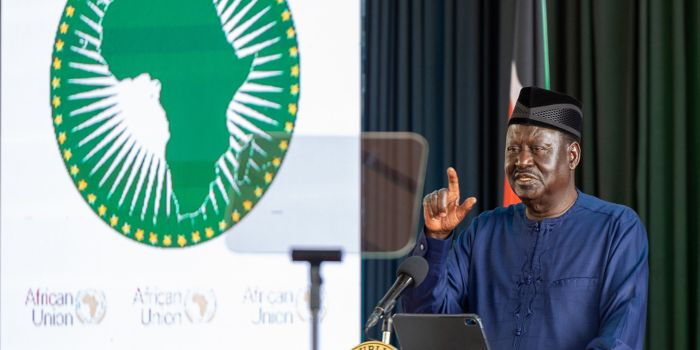Kenya’s New Strategy for the African Union’s Top Position
In 2017, Kenya put forward Amina Mohamed as its candidate for the African Union Commission (AUC) chairperson, believing she was the ideal contender due to her impressive career in diplomacy and international affairs.
Her qualifications were outstanding—she had served as Kenya’s Cabinet Secretary for Foreign Affairs (2013-2018), Permanent Representative to the United Nations (2000-2006), Chair of the International Organization for Migration (IOM), and Assistant Secretary-General at the United Nations Environment Programme.
She had also chaired the World Trade Organization’s General Council in 2005, making her one of the most experienced candidates in the race.
Recognizing her credentials, Kenya launched a massive campaign across the continent, combining high-level diplomatic meetings with outreach efforts targeting key regional voting blocs.
The government spared no expense, investing Ksh437.7 million to secure votes and rally support for Amina. However, despite a well-funded campaign, she was ultimately defeated by Chad’s Mahamat Moussa Faki.
Faki, a seasoned politician and diplomat, brought significant experience to the competition. He had previously served as Chad’s Prime Minister (2003-2005) and Foreign Affairs Minister (2008-2017).
In addition, he had held prestigious international roles, including chairing the African Union Peace and Security Council in 2013 and the UN Security Council in 2015.
During the first round of voting, Amina led narrowly with 16 votes, while Faki secured 14, with the rest split among other candidates.
However, since the AU election rules required a two-thirds majority to declare a winner, the voting process continued through multiple rounds.
Weaker candidates were gradually eliminated, and by the seventh round, Faki emerged as the winner with 38 votes, surpassing the required threshold.
Lessons from Amina Mohamed’s Defeat
After the election loss, Kenya conducted an internal review and identified several weaknesses in Amina’s campaign.
One of the biggest challenges was the structure of her campaign team. Instead of assembling a group of experienced diplomats, the government relied heavily on politicians, with then-Interior Cabinet Secretary Dr. Fred Matiang’i leading the effort.
However, Matiang’i lacked a strong background in diplomacy, which made it difficult for the team to effectively navigate the complex world of African Union politics. This misalignment between the campaign’s needs and the expertise of those running it significantly weakened Kenya’s chances.
Raila Odinga’s Strategic Approach
Learning from past mistakes, President William Ruto adopted a completely different approach for Kenya’s 2024 bid, where veteran opposition leader Raila Odinga is vying for the AU chairmanship.
This time, Kenya ensured the campaign team was composed of individuals with strong diplomatic, political, and technical expertise.
The team is being led by Foreign Affairs Principal Secretary Korir Sing’oei and includes influential figures such as former U.S. Ambassador Elkanah Odembo, IGAD Executive Secretary Mahboub Maalim, and Ambassador Anthony Okara.
Legal expert Prof. Makau Mutua and financial specialist Dr. Caroline Karugu, a former Nyeri Deputy Governor, bring additional expertise.
Data and security expert Raymond Omollo, who serves as Principal Secretary for the Ministry of Interior, is also playing a key role.
The team further includes Joseph Busiega, Chief of Staff in the Prime Cabinet Secretary’s office, and Aurelia Rono, Principal Secretary for Parliamentary Affairs, who is responsible for diplomatic relations with AU member states.
Additionally, digital strategist Pauline Njoroge is overseeing the campaign’s communications.
Building Stronger Continental Alliances
Beyond assembling a highly skilled team, Kenya has also intensified its diplomatic efforts to secure Raila’s victory.
The government has actively engaged with major African regional blocs to win their support. Kenya has hosted East African Community (EAC) leaders and extended its outreach to key continental organizations such as:
- Arab Maghreb Union (UMA)
- Common Market for Eastern and Southern Africa (COMESA)
- Community of Sahel-Saharan States (CEN-SAD)
- Economic Community of Central African States (ECCAS)
- Economic Community of West African States (ECOWAS)
- Intergovernmental Authority on Development (IGAD)
- Southern African Development Community (SADC)
This widespread engagement is aimed at consolidating support and avoiding the pitfalls of Amina Mohamed’s 2017 campaign, which struggled to secure regional backing at critical moments.
The Road Ahead for Raila Odinga
Kenya’s new approach to the AUC chairmanship reflects a well-thought-out, strategic shift. By focusing on diplomacy, securing regional alliances, and learning from past failures, the country is positioning itself for a stronger bid.
Raila Odinga, a seasoned politician with decades of experience, brings a deep understanding of African affairs, which strengthens his candidacy.
However, the race is far from easy. His main competitor, Djibouti’s Mohamoud Youssouf, is also aggressively campaigning, and internal East African Community politics could influence the final outcome.
With the election just days away, the next round of diplomatic engagements will be crucial in determining whether Kenya secures the coveted AU leadership position. Winning this seat would not only boost Kenya’s influence within the African Union but also elevate its standing in global affairs.
Join Gen z and millennials TaskForce official 2025 WhatsApp Channel To Stay Updated On time the ongoing situation https://whatsapp.com/channel/0029VaWT5gSGufImU8R0DO30


